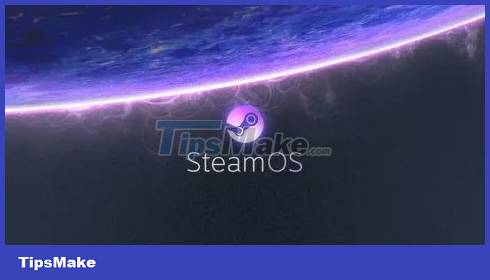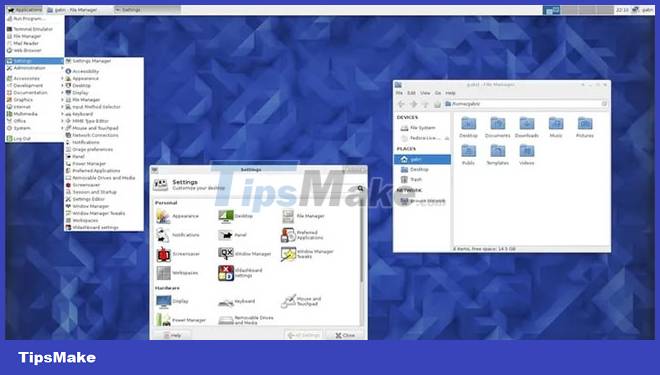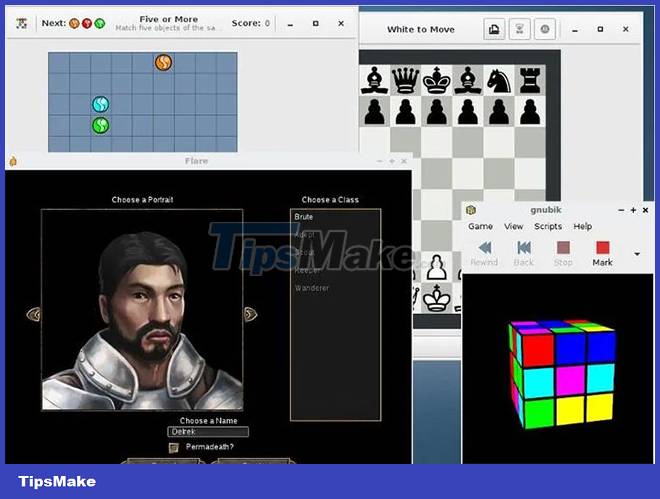5 best Linux distributions for gaming
Linux is not very prominent when it comes to games, but that doesn't mean you can't play games on this platform. In fact, there are a number of gaming-focused Linux distributions that provide out-of-the-box support for game libraries and gaming-focused hardware drivers, like graphics cards.
Here are the 5 best Linux distributions for gaming! Let's find out with TipsMake.com!
1. SteamOS
SteamOS is a Debian-based Linux distribution that comes with Valve's Steam app, allowing you to play all Steam games. The graphical environment of Steam OS is GNOME, a popular desktop environment that is highly customized within Steam OS to look even better.

SteamOS supports keyboard and joystick, so this is a perfect solution for game lovers. SteamOS also supports desktop mode but you will need to enable this mode from the Steam Settings menu. Go to Settings > Interface and select 'Enable access to the Linux desktop'. Now the exit button will have an additional option to switch to Desktop.
Steam is equipped with a large number of game categories, from Racing, Strategy, Action to First-Person Shooter, etc. Steam offers new games regularly, so if you don't find your favorite game, wait patiently, perhaps the development team is preparing to offer it to you. Steam also has a large number of free games. Some of the best free Steam games are Team Fortress 2, Dota 2, Adventure Capitalist, Radiator 2, etc.
System requirements for SteamOS:
- Processor supports Intel or AMD 64-bit.
- 4GB RAM (or more).
- Hard drive 200GB or more.
- NVIDIA (Fermi graphics card or newer), Intel or AMD graphics card (Radeon HD 5XXX or newer)
- to install.
- Support UEFI boot.
2. Fedora Game Spin
Who doesn't know Fedora? Fedora Game Spin is built for gamers with several games and tools available to install more games. Fedora Game Spin has the largest capacity (4GB) among all the distros mentioned in this list. Some popular pre-installed Linux games are Battle for Wesnoth, FreeCiv, Scorched 3D, SuperTuxKart, and Nethack.

Due to size limitations, Steam and PlayOnLinux are not pre-installed but are available in stock. default repository, along with a large number of games that you can directly install. To make Fedora Game Spin faster, this distro comes with the XFCE lightweight desktop environment.
System requirements for Fedora Game Spin:
- RAM 1GB or more (2GB recommended)
- Processor 2.0GHz or higher (64bit recommended)
- Hard drive capacity of 10GB or more (recommended 20GB)
- Pendrive/USB 8GB or DVD-RW for installation
- Intel/Nvidia/AMD graphics card
- Wired or wireless Internet connection
3. SparkyLinux GameOver
SparkyLinux GameOver is a gaming edition from SparkyLinux. It is based on Debian's stable branch and uses one of the lightest desktop environments, LXDE. LXDE is known for its simplicity and lightning speed. GameOver is full of classic and console games. If you like playing classic games then SparkyLinux GameOver is a distro for you. Although there is a very small collection of apps, there are plenty of games to enjoy in Sparky.

SparkyLinux Gaming Linux is also offered with Steam, PlayOnLinux and DOSbox. So besides the pre-installed games, you are also equipped to install games on Steam and play DOS games with DOSbox.
System requirements for SparkyLinux:
- CPU i586/amd64
- 256 MB of RAM (some games need more - 500 - 1000MB is recommended)
- Optical DVD drive or 4GB USB as Live installation media
- 20GB of space for installation on hard drive (30GB recommended)
- 16GB USB Flash/Pen for "normal" installation (32GB recommended)
4. ChimeraOS
An impressive option for gaming on Linux, ChimeraOS (formerly GamerOS) comes pre-installed with the Steam client, set to Big Picture mode. It also includes Gamescope, the processor included in SteamOS that offers various display enhancements (including upscaling). Along with titles from the Steam library, you can install games from GOG, Epic Games Store, and even Flathub.
ChimeraOS requires no configuration. Just install, launch, sign in to your favorite game services and download the game before playing. In many ways, this is the complete Linux gaming distribution.
System requirements for ChimeraOS:
- CPU: Dual core, 2GHz
- RAM: 4GB
- Memory: 20GB
- GPU: NVIDIA GTX 900, AMD RX 400 or Intel HD Graphics 500
5. Drauger OS
Based on Ubuntu and using the Xfce desktop environment and Pipewire audio, Drauger OS has been designed with gaming performance in mind.
Designed 'explicitly for gaming', Drauger OS is maintained by a small community but runs games with ease. This is achieved by making tweaks to the kernel, thereby improving on the original Ubuntu, for an optimal Linux-based gaming experience.
The downside to this is that Drauger OS is less flexible than a standard Ubuntu installation. While basic productivity tasks can be achieved, some other tasks will not be possible or will require longer installation and setup times.
System requirements for Drauger OS:
- CPU: Dual-core processor, 1.8 GHz, 64-bit
- RAM: 1GB
- Memory: 32GB
- GPU: Integrated
Hope you find the right choice!